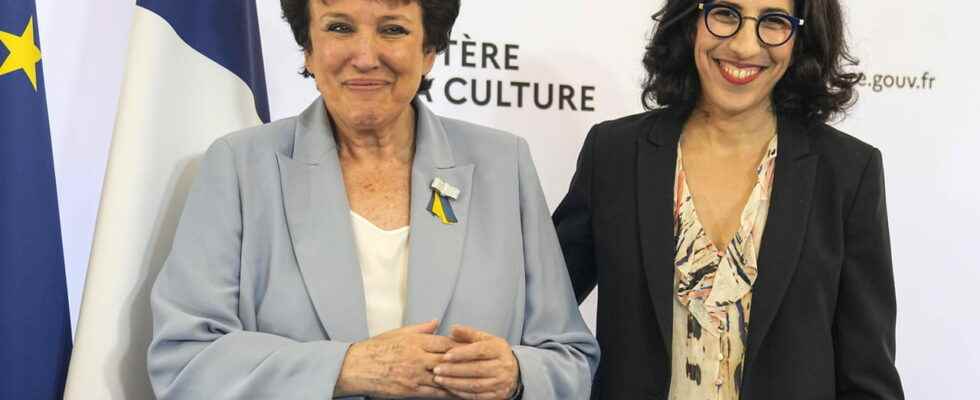09:28 – 14 men and 13 women in government
In total (ministers, deputy ministers and secretary of state included), 27 people have been appointed to form the new government. With almost perfect parity: 14 men for 13 women. These are also partly appointed to full-fledged ministries: Catherine Colonna in Foreign Affairs, Amélie de Montchalin in Ecological Transition, Brigitte Bourguignon in Health, Sylvie Retailleau in Higher Education, Yaël Braun-Pivet in Overseas -sea, Rima Abdul Malak in Culture, Agnès Pannier-Runacher in Energy Transition and Amélie Oudéa-Castéra in Sports.
09:13 – Government heavyweights failed
Heavyweights from the Castex government have failed in the new government of Elisabeth Borne. Jean-Michel Blanquer, Roselyne Bachelot, Marlène Schiappa, but also Jean-Yves Le Drian, Florence Parly, Jean-Baptiste Djebbari, or Barbara Pompili are not returning. Some, probably for their media coverage and the rejection they may have inspired, others no doubt because they came to the end of the race in government or rallied politicians who did not bring enough to the majority.
09:07 – 14 Castex government ministers reappointed
Hello and welcome to this live where we will continue to decipher the Borne government announced yesterday. Emmanuel Macron promised a great upheaval, it is ultimately only partial. 14 ministers of the Castex government have indeed retained ministerial prerogatives, the same or new: Bruno Le Maire, Gérald Darmanin, Eric Dupond-Moretti, Amélie de Montchalin, Sébastien Lecornu, Brigitte Bourguignon, Olivier Dussopt, Marc Fesneau, Agnès Pannier-Runacher , Olivier Véran, Gabriel Attal, Franck Riester, Clémeant Beaune and Olivia Gregory.
05/20/22 – 11:43 p.m. – Between Ndiaye and Blanquer, “it’s the big gap”
END OF LIVE – 180° turn. This is how many observers perceive the arrival of Pap Ndiaye at the Ministry of National Education, held for five years by Jean-Michel Blanquer. Because the two men oppose on several points and not the least. On “Islamo-leftism” for example, Ndiaye recently judged that the term “did not designate any reality”, while Blanquer was alarmed at the “danger” that it represented. In the columns of Le Parisien, historian Pascal Blanchard, a specialist in the history of immigration, believes that “it was the big gap after Blanquer who led his ministry in a very political way, but it is perhaps a way to rebalance things. It will be a minister who listens to the teachers, knows the issues”. A teacher unionist goes further, saying that this appointment is “a counter-stance, even a slap in the face for the former minister”.
05/20/22 – 11:14 p.m. – The new Minister of Education, Pap Ndiaye, under fire from critics
Barely appointed new Minister of National Education, the historian Pap Ndiaye finds himself in the crosshairs of the detractors of the majority, and more particularly of the far right. “Emmanuel Macron had said that the History of France had to be deconstructed. Pap Ndiaye will take care of it”, reacted strongly Éric Zemmour, while Marine Le Pen denounced the appointment of an “assumed indigenist”, denouncing ” the last stone in the deconstruction of our country, its values and its future”. The spokesperson for the National Rally, Julien Odoul, deplored the arrival of an “immigrationist activist”. For him, “this appointment goes beyond the bounds of provocation”. “The government of Macron? The clan of careerists. With a bonus to leftism embodied by the new Minister of National Education: Pap Ndiaye, the promoter of minorities and migrants”, was, meanwhile, annoyed Guillaume Peltier , vice-president of Reconquest!.
05/20/22 – 10:08 pm – What about the portion of new ministers in the Borne government?
Between the entries, the exits, those who have changed ministry and those who have remained in their place, it is not always easy to find your way around. To see more clearly, here are some figures. Compared to the previous Castex government, that of Elisabeth Borne has seen 50% of its workforce changed. However, they are only three ministers to have kept their post. They are Gérald Darmanin, in the Interior, Bruno Le Maire, in the Economy, and Éric Dupond-Moretti, in Justice.
